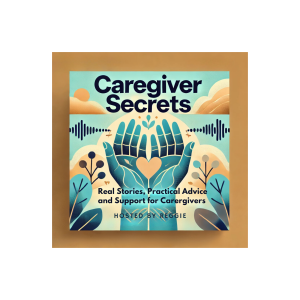
Saturday Dec 07, 2024
Ep 1 7 Secrets to Stop Sundowning: How Caregivers Can Calm Dementia Chaos and Regain Peace
Welcome to today’s episode of Caregiver Secrets. Where we share practical advice, research, emotional support and resources for caregivers of loved ones. Hi, my name is Reginald Reglus and I am glad you are here today. A little about me, I am a caregiver for my beautiful mom and I have been for about 10 years, when she was diagnosed with dementia. I have learned so much about so many things from this experience and continue to learn and I want to share it with you.
Important note is that is is not medical, financial or health advice. Please seek out a proper professional for any matter you are dealing with. My goal is to inform you as best I can, but you and your alone are totally responsible for doing your own research and taking the proper action.
Today, I want to talk about a topic that many caregivers of loved ones with dementia face. It is called sundowning. If you’re caring for someone with dementia, chances are you’ve experienced or at least heard of something called "sundowning." It’s one of the more challenging aspects of caregiving, and today we’ll dive into what sundowning is, explore the latest research, and provide you with seven strategies to help manage it.
What is Sundowning?
Sundowning, also known as "late-day confusion," refers to a state of increased confusion, agitation, and restlessness that often occurs in people with dementia during the late afternoon or early evening. This behavior can be stressful for caregivers, as it typically happens when they are already exhausted from the day. For someone with dementia, sundowning can present as irritability, disorientation, pacing, or even aggression. The exact cause isn’t entirely clear, but it is believed to be linked to changes in the body’s internal clock, fatigue, and sensory overload.
Here is some Recent Research on Sundowning for you.
A 2022 study published in Alzheimer's & Dementia journal took a closer look at the neurobiological changes that might contribute to sundowning. The research showed a connection between disruptions in circadian rhythms (our body’s natural 24-hour cycle) and increased sundowning behaviors in those with dementia. Specifically, disruptions in the production of melatonin—a hormone that regulates sleep—may play a key role.
Other studies have shown that environmental factors, like poor lighting, excess noise, or overstimulation during the day, may also exacerbate sundowning symptoms. While there is no definitive cure for sundowning, these insights offer hope for better management through environmental adjustments and caregiving strategies.
Now, let’s explore seven practical strategies you can implement to manage sundowning and help both yourself and your loved one through these challenging moments.
1. Establish a Consistent Routine
People with dementia tend to feel more secure when their days are structured. Try to create a daily routine that includes regular times for waking, meals, activities, and bedtime. This consistency can help reduce anxiety and minimize the unpredictability that often triggers sundowning.
2. Adjust Lighting as Evening Approaches
As daylight fades, the lack of light can confuse and disorient someone with dementia. To combat this, gradually increase indoor lighting in the late afternoon and evening. Soft, warm lighting can create a calm environment. In some cases, exposure to natural sunlight during the day can also help regulate the body’s internal clock.
3. Limit Stimulants in the Afternoon
Be mindful of what your loved one eats and drinks, especially later in the day. Caffeine, sugar, or heavy meals in the afternoon can contribute to restlessness in the evening. Instead, opt for light, easily digestible meals, and avoid stimulants like coffee, tea, or chocolate in the hours leading up to sundown.
4. Provide Calming Activities
Keeping your loved one engaged in calming, purposeful activities can help reduce anxiety. Consider activities like listening to soothing music, gentle stretching, or even folding laundry. Avoid overstimulating tasks like watching fast-paced TV shows or having loud conversations, as these can trigger more agitation.
5. Create a Peaceful Environment
An overstimulating environment can worsen sundowning behaviors. Try to create a peaceful atmosphere in your home during the late afternoon and evening. Reduce noise, dim screens, and remove distractions. A calm environment will help your loved one feel more at ease.
6. Promote Daytime Activity
Encourage your loved one to stay active during the day, whether it’s through light exercise, short walks, or social engagement. Regular daytime activity can help improve sleep at night and reduce agitation in the evening. Be cautious not to let them nap too much, as excessive daytime sleeping can disrupt their circadian rhythms.
7. Care for Yourself as a Caregiver
It’s easy to lose yourself in the daily care of a loved one, but your well-being is just as important. Caregiver stress and burnout are real concerns, especially when dealing with challenging behaviors like sundowning. Take time to practice self-care—whether it’s taking a break, asking for help, or seeking support from a caregiver community. Studies show that caregivers who maintain their own mental and physical health are better able to provide quality care to their loved ones.
Listen to me my friend, caring for someone with dementia can be emotionally and physically draining, especially when sundowning becomes part of the routine. But by creating a calming environment, establishing a consistent schedule, and focusing on both your loved one's and your own well-being, you can make these late-day episodes more manageable. Remember, you’re not alone in this journey. Reach out to other caregivers, professionals, and communities for support when you need it.
Thank you for tuning in to this episode of Caregiver Secrets. If you found this helpful, please subscribe, and share it with others who may benefit.
This is Reginald Reglus and until next time, take care of yourself and your loved one.
No comments yet. Be the first to say something!